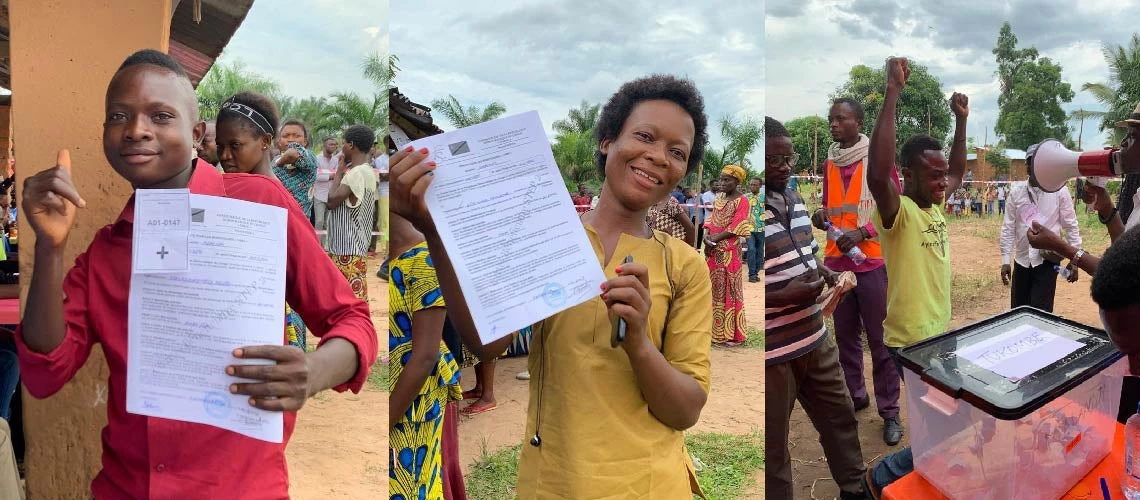 Public lottery for the DRC Social Fund’s Public Work Program, Kasai Central, DRC, November 2020. © DRC Social Fund
Public lottery for the DRC Social Fund’s Public Work Program, Kasai Central, DRC, November 2020. © DRC Social Fund
Social protection programs have become a critical part of the response to the COVID-19 crisis in countries around the world. About 1,400 new measures worth a trillion US dollars have been introduced in the last year to protect a billion people. This unprecedented surge is reviving policy discussions about who should receive social transfers. In development circles, this is known as the “targeting” debate.
There is an abundance of literature on targeting and the performance of various methods to select the poor and vulnerable: community-based, proxy-means testing, etc. Yet, with one exception (2020), authoritative global reviews (2004, 2009 and 2017) are silent about a common approach: lotteries. Lotteries have been used in public works programs in countries as diverse as Argentina, the Central African Republic and Laos. Beyond social assistance, governments have also favored lotteries as a way to implement public policies, including school admissions, military draft, visa allocation and vaccine distribution.
Lotteries in public works
Let’s look at efficiency first, i.e., the extent to which actual aid recipients match the intended beneficiaries. The standard workfare model – a welfare system that requires recipients to work or take training – argues that the poorer the person, the lower their opportunity cost. Only the poor would enroll in public works programs, as the benefit would be too little, or the effort required too great to attract the rich. In this sense, the work requirement generates self-selection among people. Poverty profiles of lottery participants in Cote d’Ivoire and India confirm that self-selection works.
But is it fair? What matters here is that a lottery gives equally-deserving people an equal chance to receive the benefit. The lottery system is transparent, easily understood by all. Also, lotteries are held in the open and the process is participatory, with people actively engaging during the draw. These considerations are important in fragile and violent settings where communities may distrust officials and external actors. A recent example is the contested Ebola response in eastern Democratic Republic of Congo. In such contexts, the do-no-harm principle necessitates us to let legitimacy prevail over efficiency.
Last – and this is overlooked in the targeting debate – operational readiness is essential for crisis response. In that respect, lotteries are ideal: they are inexpensive and quick to organize; no technology or administrative capacity is required; and they are replicable in any environment, both rural and urban. Londo, a national program in the Central African Republic, carried out lotteries without incident in all 71 districts of the war-torn country. In a nutshell, lotteries are ideal for these emergency operations in low capacity, fragile contexts.
When is “luck” an appropriate targeting mechanism?
When the needs of the poor and vulnerable are so high, relying on luck to extend crucial social benefits may sound like a surprising choice. But under some conditions, this may be the best strategy:
- There is a lack of data regarding the population, i.e., no social registry, fiscal records, or ways to get an accurate picture of the people in need.
- Fixing that data gap – what other targeting methods do – increases the risk of violence, which is often the case in contexts of low social cohesion and distrust of outsiders.
- The target group is relatively homogenous, and there is no need to distinguish between levels of poverty, such as among households in a slum during a lockdown.
The new frontier: extending lotteries to cash transfers?
Conventional wisdom says that lotteries make no sense for cash transfers since without the work requirement, self-selection does not apply. Indeed, no cash transfer program uses lotteries for targeting. But, let’s discuss how lotteries would compare against the most widespread targeting methods.
Several studies have assessed and compared the efficiency of actual targeting methods by benchmarking them against a “worse-case” no-targeting scenario defined as a random selection of beneficiaries – in other words, simulating a lottery. The main result of these comparative exercises is that, often, a lottery would perform as well as community or survey-based methods in ultra-poor settings, especially for programs responding to covariate shocks, e.g., severe food insecurity or forced displacement. Overall the variations between targeting methods are arguably small during crises, so that efficiency may not be a conclusive argument.
When it comes to legitimacy, we have no evidence of how lotteries in cash transfers programs would be perceived by the population. However, we know the counterfactuals: current targeting methods have been questioned and have sometimes exacerbated tensions when poverty is widespread. The challenges of categorical targeting have been documented with programs for refugees in poor host communities. The complexity of survey-based targeting can undermine trust as people are not aware of poverty scoring algorithms. Community-based targeting faces the risk of manipulation by local committees and authorities.
On operational readiness, the evidence is largely anecdotal and there is no proper comparative research. Most would agree however that organizing lotteries is low-cost, takes days, and requires no skills; community-based targeting is affordable, takes weeks, and works with basic administration; and surveying household poverty is expensive, should be planned over months, and needs advanced skills and higher administration. When you are short of budget, time, and capacity, that is in most emergencies, the standard targeting methods may not compare well against a lottery.
An invitation for more discussions, research, and experimentation
Lotteries do not have the elegance and sophistication of other targeting methods, but their simplicity may be valuable, offering a solid alternative that enables us to quickly scale-up social safety nets in the most challenging contexts. It’s also worth considering for the social response to the pandemic. We’d be very interested in hearing your views and any insights you can share from your experience.



Join the Conversation